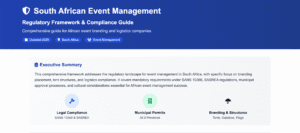Events can be wonderful, yet planning and executing them is often a daunting task. In fact, successful event execution involves careful management across various stages from initial concept to post-event evaluation.
This article will guide you through the art of executing events like a pro, equipping you with practical tips and tactics that ensure seamless operations. Ready to transform your event planning experience? Let’s dive in!
Key Takeaways
- Setting clear goals and objectives is crucial for the success of an event.
- Creating a solid event budget helps in efficient resource allocation and decision-making.
- Finding suitable vendors and coordinating their services is essential for effective event planning.
- Coordinating the day of the event involves tasks like team briefings, overseeing vendor setup, and managing event timing.
- Analyzing event data provides valuable insights that can improve future events.
- Staffing your event with knowledgeable staff contributes to smooth planning and coordination.
- Utilizing technology can optimize processes, enhance attendee experiences, and extend the reach of events.
- Lead capture at events allows organizations to generate new business opportunities and measure ROI.
Identifying Your Event Needs

Setting ROI-Driven Goals and Objectives ensures that your event aligns with your business objectives and provides measurable results.
Setting ROI-Driven Goals and Objectives
Clear event goals and key performance indicators serve as the cornerstone of every successful event strategy. To maximize the return on investment (ROI), you must set measurable objectives for your event marketing.
This involves identifying what success looks like to you, whether it’s ticket sales, social media mentions or survey feedback. Tracking these metrics provides valuable insights into your event’s performance, helping make data-driven decisions for future events.
Defining such ROI-driven goals initiates the path towards an effective event planning process and efficient use of budget resources while aligning your actions with predetermined targets.
Creating a Solid Event Budget
Creating a solid event budget forms the backbone of any successful event. It is about more than just controlling costs; it’s also about fully understanding your expenses and income potentials.
This valuable tool serves to guide every decision you’ll make in the planning process, from choosing a venue to selecting vendors. With an effective budget in place, you can allocate resources efficiently.
A comprehensive event budget includes factors like company size, event objective, scale and size of the event. Overlooking these aspects may lead to unexpected issues during execution or inadequate resource management.
A clear and straightforward financial plan leads to informed decision-making which inevitably ensures smooth execution and overall success of an event.
Planning and Designing Your Event

When planning and designing your event, you will need to find suitable event vendors and coordinate the logistics for the day of the event.
Finding Event Vendors
Securing the right event vendors is a critical part of your event planning and design phase.
- Identify your event needs before embarking on the search for vendors. Understand what you require from them, what tasks they will perform, and how their services align with your overall event strategy.
- Start preparing early. Give yourself ample time to communicate with potential vendors, discuss deliverables, and ensure they can meet your set deadlines.
- Engage professional event organisers or coordinators when selecting vendors. Their experience in the field can be invaluable in securing reliable service providers.
- Conduct thorough vetting processes for potential vendors. Check their past performance, client reviews and ensure they can handle the scale of your event.
- Keep an eye on costs when engaging suppliers to avoid overspending on the budget. Comparing prices across different service providers can help you get value for money.
- Communicate effectively with your chosen vendor teams, whether it’s about logistics or design specifics to keep misunderstandings at bay.
- Leverage technology where possible to streamline vendor management processes such as booking, payment processing or task tracking.
- Regularly assess the performance of your contracted events services providers to ensure smooth execution of tasks leading up to the event day.
Coordinating the Day of the Event
Executing a flawless event demands effective coordination on the day. Here is an actionable checklist to guide through this crucial stage of event management:
- Begin the day with a team briefing: Share the schedule and individual responsibilities with your staff.
- Open communication lines: Ensure all team members, vendors and key guests can reach you in case of emergencies.
- Oversee vendor setup: Make sure all suppliers arrive on time and correctly set up their services.
- Implement task management systems: Assign and monitor tasks through an efficient task management tool.
- Conduct regular check-ins: Regularly check-in with different teams to assess progress against the event objectives.
- Maintain a positive environment: Keep spirits high among your team for successful execution of planned activities.
- Resolve issues promptly: Handle unexpected problems by brainstorming solutions without any delays.
- Manage event timing: Stick closely to the event timeline to keep guests engaged and satisfied.
Evaluating Your Event’s Performance
Analyzing event data is crucial in determining its success and making improvements for future events.
Using Event Data for Future Success
Data acquired from events serves as a vital tool for planning future successes. This process involves collecting, analysing and applying information gathered during an event. Crucial indicators such as the number of attendees, audience engagement, ticket sales and satisfaction levels provide valuable insights into the event’s performance.
Implementing Event KPIs helps in setting specific goals that pave the way for future improvements. Tracking these metrics offers a distinct perspective on what worked well and what didn’t.
Analysing this data aids in making informed decisions and strategising more effectively to ensure successful upcoming events. Making wise use of collected data can potentially transform mediocre occasions into outstanding, memorable experiences.
Tips for Successful Event Execution
Staff your event with knowledgeable and enthusiastic staff, utilize technology for seamless logistics, and capture leads effectively. Read on to learn how to ensure the success of your next event execution.
Staffing
Critical to every successful event is the team behind it, which makes staffing an essential aspect of event execution. Bringing together professionals with clear roles and expertise contributes significantly towards ensuring smooth planning and coordination.
From event planners who apply their skillset in organising details effectively, to personnel responsible for various tasks during the day, each member plays a crucial role. A well-selected staff creates an environment where challenges can be met swiftly without disrupting the flow of the occasion.
Investing time and effort into selecting, hiring or recruiting trained individuals guarantees not only excellent performance but also a positive attendee experience at your event.
Utilizing Technology
Integrating technology into event execution can optimise processes and enhance attendee experiences. A myriad of digital tools are available that streamline various functions, from ticketing to day-of-event coordination.
Mobile ticketing systems present digital solutions for easy access and presentation of tickets by attendees. This not only reduces the logistical load but also enhances guest satisfaction through swift processing.
Technological advancements have revolutionized event production as well. Tools such as flexible event management software cater to both in-person and virtual events, assisting with everything from vendor coordination to audience engagement.
Live streaming platforms extend the reach of events beyond physical borders, enabling a broad global audience to participate remotely. Furthermore, AI technologies are now stepping onto the stage of event management, providing superior efficiency and personalised interactions for attendees.
In this era where virtual events are becoming ever more prevalent, leveraging appropriate technology is vital for successful event execution.
Lead Capture
Lead capture is a crucial component of successful event execution. It involves implementing strategies to collect information from potential customers or leads, such as their contact details and preferences.
By capturing leads at an event, organizations can build a database of potential customers who have expressed interest in their products or services. This data can then be used for targeted marketing campaigns, customer relationship management, and sales follow-ups.
Lead capture not only helps organizations generate new business opportunities but also allows them to measure the effectiveness of their events and track return on investment (ROI).
Conclusion: The Key to Successful Event Execution
Successful event execution is the result of careful planning, coordination, and attention to detail. By setting clear goals and objectives, creating a solid budget, and utilizing technology, organizers can ensure a smooth and successful event.
Additionally, having a well-trained staff and capturing leads effectively can contribute to the overall success of the event. With these key elements in place, event execution becomes a seamless process that leaves attendees with a memorable experience.
What Are the Steps Involved in the Event Execution Process?
The event execution process comprises several crucial steps to ensure the successful management and coordination of events. Initial planning and conceptualization set the foundation, followed by identifying and securing suitable venues. Once preparations are complete, event promotion and marketing activities take place. On the day of the event, logistical arrangements, such as registration, setup, and audiovisual arrangements, are finalized. Finally, post-event evaluations help gauge success and identify areas for improvement in the event execution process.
What is the Role of Event Consultation Services in the Event Execution Process?
Event consultation services play a crucial role in the event execution process by providing professional guidance and support. These services help in planning, coordinating, and executing events seamlessly. With their expertise, event consultation services ensure effective budgeting, venue selection, vendor management, and overall event logistics. They also offer creative ideas and innovative solutions to make events memorable and successful.
FAQs
1. How do I start planning an event?
To start planning an event, you should first determine the purpose and goals of the event, create a budget, select a suitable venue, and establish a timeline for tasks.
2. What are the key steps in executing an event?
The key steps in executing an event include coordinating with vendors and suppliers, managing logistics such as catering and transportation, setting up the venue, ensuring smooth flow of activities during the event, and conducting post-event evaluations.
3. How can I ensure that my event runs smoothly?
To ensure your event runs smoothly, make sure to communicate effectively with all stakeholders involved, have contingency plans in place for any potential issues or emergencies, assign clear roles and responsibilities to team members on-site, and conduct thorough rehearsals before the actual event.
4. What is the role of an event coordinator or planner?
An event coordinator or planner is responsible for overseeing all aspects of the event including budgeting, sourcing venues and vendors, coordinating logistics, managing timelines and schedules while ensuring that all details align with the client’s vision and objectives.
5. How long does it take to execute an average-sized corporate conference?
The time it takes to execute an average-sized corporate conference varies depending on various factors such as complexity of program schedule or agenda but typically ranges from 6 to 12 months prior to the date of the conference.




